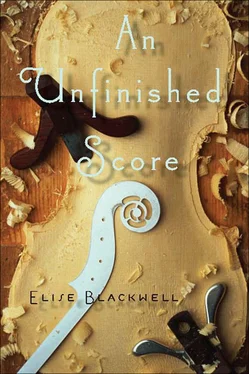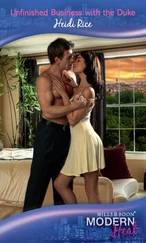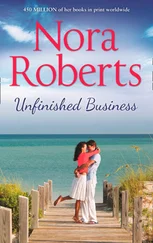Having married a domineering woman from a rich family whose wealth has been diluted but not drained by generational expansion, Anthony thinks always of the books and of appearances. He is a man who subtracts tax and wine before figuring a tip, who divides a four-way bill not into quarters but by calculating the exact cost of each person’s meal. The sole time Suzanne saw him pick up a whole check — at a luncheon with his father-in-law and a potential donor — he figured the tip in odd cents to make the total charge an even number, leaving the poor server to count out from the till her too-few dollars and sixty-seven cents. “Makes the ledger much cleaner,” he announced as he produced the loops of his elaborate signature.
“Cherubini,” Petra whispered, not softly, making Suzanne smile though she tried not to.
Maria Luigi Cherubini . As directeur du conservatoire he was dictatorial, demanding separate entrances for men and women and once chasing Berlioz around the library tables for using the wrong one. Cherubini . Timid in his harmonies, known to history as a textbook composer of white-key music of no great significance, now a man seen but not heard: the Louvre’s millions of visitors see his face, as painted by Ingres, but few hear his music. Yet in his day he was considered by Beethoven to be one of the immortals. He was admired by musicians for his technique and was financially successful during a time when the Parisian scene was all about money.
Cherubini . A way for the quartet to think about Anthony, who plays his violin with a rare and sturdy clarity and is capable of originality of interpretation — particularly of Debussy — that baffles those who know him away from his instrument. His tastes, when he steps away from questions of money, when he considers the Princeton quartet’s critical as well as monetary success, are fine if a bit cold. His choices for the quartet have been mostly wise, including bringing in Andres Flanders to perform Bocherinni’s fifth guitar quintet as part of last year’s February program. He’s also made a name as a reviewer, his exertions toward fairness giving decency to his fastidious judgments. Ben should hate him, yet does not, which Suzanne supposes suggests something good about them both. And because Anthony functions by reason and not by feeling, he is easy enough to work with. He holds no grudges. Suzanne arrives on time, works hard, and knows what to expect.
Too often, though, Anthony stays near safe musical shores. The quartet plays Beethoven and Bach, of course, and sometimes Brahms or Ravel. Never Janáček and never the Shostakovich string music that Suzanne loves. Anthony is cautious about including contemporary composers, keeping them occasional and unassailable. All too often the quartet’s programs include some piece of pretty-headed, many-noted brunch music by Haydn or Telemann — music written at the behest of someone who could pay for it. Suzanne fears that one day the quartet will wind up playing “Happy Birthday” for some snarling old woman or unctuous child before she realizes what is happening in time to stop it.
“At least you play for a living,” Ben said when Suzanne complained about a Vivaldi quartet, a piece of music she knew Ben despised. So many times at Curtis she had heard him say, “Vivaldi is the enemy of music’s future — and its past.”
Alex always called Vivaldi supermarket cake frosting — pretty if you don’t know better, unpalatable if you’ve eaten freshly whipped cream on real pastry. Like Suzanne, he loved Fauré, that undervalued treasure, the musician’s composer. Though they broke on new music, she and Alex shared some peculiarities of taste, including an adoration of Janáček, his seemingly reckless juxtapositions, his refusal to comfort with transitions of either melody or silence, his controlled anger, his generosity, his respectful demands on the musicians who would play him, their finger pads be damned. And they shared an unlikely soft spot for Schubert, poor drowned boy who should have been stronger but whose music is so bright it sparkles. Suzanne understands that weakness is a fact of her art but knows it is not true that Schubert and the great composers wrote out of their insanity and indulgence. They wrote around it, despite it, as best as they could in the midst of it.
Today the quartet works on a piece surprising from Anthony: Bartók’s sonorous but disturbing final quartet, written while the composer was changing publishers after refusing to answer a Nazi-authored questionnaire about his race. He was contemplating the larger decision of changing countries, though he would wait to move until the death of his mother, whom he supported. No doubt Anthony — who might well have filled out that paperwork to protect his position — chose the Bartók as a show-off piece. He hopes they will impress the audience with their glissandos, with the ponticello and con legno bowings, with the acrobatic stoppings and the notorious Bartók pizzicato. They will play the piece first, to a still fresh audience, or perhaps sandwich it between intermission and some problem-free piece that will let the people leave happy.
They repeat brief and long segments, hammer a few measures at a time, begin anew. They finish with a full run-through, playing through their small errors of timing as though they have to, as though they are on stage. This reminds Suzanne of the funniest thing Rachmaninoff ever said. Playing with the famous composer in music’s most famous venue, violinist Fritz Kreisler lost his place and whispered, “Do you know where we are?” Rachmaninoff, the story goes, didn’t wait a beat before saying, at a volume audible to several rows of the audience, “Carnegie Hall.”
The quartet works hard today, but the music’s difficulty brings pleasure and absorbs the hours, even for Suzanne. Like most musicians, they turn into children when they play pizzicato. Daniel grins, bobs his head, exaggerates the movements of his hands and the tapping of his big foot. Just as Suzanne realizes she, too, is smiling, the piece is over and she returns to herself. Grief floods her, her smile now just a strange shape on her face.
The grief is for Alex, mostly, but it bleeds into the sadness she feels every time music is made and then gone — something real and loud in the air that disappears from all but memory. Sometimes Suzanne strains to imagine the music still living, playing on in some version of reality not organized by time, all its notes together like colors in black paint or white light. It might be a place, she thinks now, in which you can love two people without diminishing either.
As they pack their instruments, Petra’s whisper is a hiss: “Coffee.”
“Don’t you have to pick up Adele?” Suzanne says, folding a flannel swathe around the viola’s neck, careful with eye contact.
“You know the schedule. We have over an hour.”
They agree to walk the short diagonal to the edge of campus and then the half block to the coffeehouse on Witherspoon, which they both like even though the coffee is as thick as syrup. Daniel lingers, watching them leave, but they do not invite him to join them. Though the breeze is cool, under it sits a hot day — the summer to come — and Suzanne’s back feels slick by the time they climb the three stone steps into the shop.
Exiting as they enter is her friend Elizabeth. “It’s a small world,” she says, making an easy pun of the coffeehouse’s name.
She embraces Suzanne, pressing her into the large breasts that can only be called a bosom. Elizabeth’s maternal exuberance is how they met, at the public library, where Elizabeth spotted her as new in town and invited her to the first of many potlucks, warmly adopting her and Ben into Princeton community life despite their oddities, despite Ben’s cool reserve, despite their lack of children.
Читать дальше












